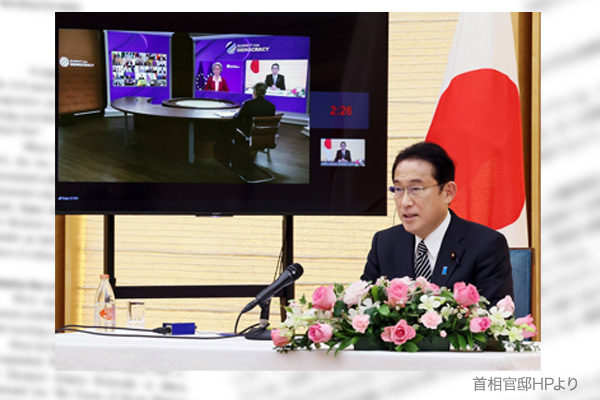U.S. President Joe Biden hosted an online Summit for Democracy on December 9 and 10. He invited leaders of around 110 countries to the unusually large meeting. Though the advisability of the selection of invitees was called into question from a strategic viewpoint, we should note the summit launched a new framework named Export Controls and Human Rights Initiative. The problem is that Japan neither signed nor supported an important joint statement on the initiative.
The initiative calls for developing a code of conduct in one year for like-minded states to use export control measures to prevent surveillance cameras, face recognition and other advanced technologies from being used for human rights abuse. The United States, Australia and some other countries signed up to the initiative. The United Kingdom, France, Canada and the Netherlands expressed support for the initiative. But Japan is not among signatories or supporters. The Japanese decision was made by the Foreign Ministry that is reluctant to provoke China. Japan took the same approach as South Korea. Is it appropriate for Japan to keep step with South Korea in this regard?
In response to a U.S. prior inquiry about Japan’s participation in the initiative, the Foreign Ministry is said to have told Washington that Japan would refrain from being named in the statement but participate in future consultations on the matter. Isn’t it selfish for Japan to join consultations without supporting the initiative? Even if belated, Japan should support the initiative.
Do not be hesitant about export controls
In response to Beijing’s human rights abuse in the Xinjiang Uyghur autonomous region, the U.S. and Europe have not only imposed sanctions but also applied trade measures including export controls. At a meeting of Group of Seven trade ministers in October, a joint statement recognized that trade policy such as export and import controls could be an effective tool as a joint action against human rights abuse. Japan is the only G7 member that has yet to take any such trade policy. It is clear that Japan can no longer avoid trade controls.
Nevertheless, the Foreign Ministry has been persistently negative about trade controls out of consideration for the relationship with China. Moreover, it has tried to prevent news media from paying attention to this issue. The ministry’s summary of the G7 summit communique in June omitted a part related to the issue.
But Japan with advanced technologies is responsible for export controls to block human rights abuse. Although such controls should be implemented prudently, I doubt if Japan that lacks such export control regime can be viewed as giving weight to human rights. Japan should also enhance intelligence capabilities as a matter of course.
Kishida’s basic stance called into question
The Japanese government is taking diplomatic attitude of currying favor with China even when creating a system that does not single out China. Some in Washington shoot a skeptical look at the Fumio Kishida administration that it might be giving priority to next year’s 50th anniversary of Japan’s normalization of relations with China. Prime Minister Kishida hopes to visit the U.S. soon for talks with President Biden. In the current situation where Japan has not supported the U.S.-led human rights initiative, however, I doubt if Kishida can confidently declare that Japan shares basic values with the U.S.
Supporting the initiative does not mean just following the lead of the U.S. Questions are being raised about the Kishida administration’s basic position on human rights in light of Japan’s own national interests.
Masahiko Hosokawa is a professor at Meisei University and a former director-general of the Trade Control Department at Japan’s Ministry of Economy, Trade and Industry. He is also a Planning Committee member at the Japan Institute for National Fundamentals.


